Hassan Ibrahim | Mamoun al-Bustani | Lujain Mourad
The educational process has witnessed complex conditions since the outbreak of the Syrian revolution in March 2011, in which economic factors have overlapped with security and political factors, leaving a devastating impact on the future-building sector, which also affected the teachers, not only students.
While studies were not interrupted in regime-controlled areas, the education in northwestern Syria was subject to tremors that targeted the teaching staff, as many teachers found themselves forced to abandon their “sacred duty” and passion and engage in other activities to secure a living for themselves and their families.
Responsibility for this has been shuffled around by the numerous parties that are supposed to be in charge of managing public life in the region, and those who adopt ensuring the continuity of education and securing the pensions of the teaching staff were absent. Nevertheless, many teachers sacrificed for the great mission and served with intermittent or no salaries.
In this in-depth article, Enab Baladi discusses with a group of experts and related parties the conditions and reality of teachers in northwestern Syria and sheds light on the source of salaries, funding bodies, and the reasons for the irregular finance for the education sector in the region.
Distress continues
During the long educational journey in Idlib, the teacher falters between his belief in the necessity of continuing the educational process on the one hand and the intermittent income that controls his living situation and livelihood on the other.
Since the suspension of the Chemonics funding in late 2019, thousands of teachers have been subject to intermittent salaries, while others have found themselves obliged to volunteer until the end of the current school year, where their wages have been restricted to food rations that are barely sufficient, if existed.
“I give lessons in the morning, and I work as a guard at night,” Shaaban al-Ali, 40, said, complaining about his fears of threats to the educational process in Idlib and his need for an income to feed his six children.
Shaaban, a French language teacher in Idlib countryside, added to Enab Baladi, “I have been working for more than three years voluntarily, during which time I have not received any financial compensation, like thousands of teachers who were forced to work in various professions besides education, to earn their livelihood without giving up their faith in knowledge and its importance.
Shaaban attributed the deterioration of the educational process to the poor conditions of the educational staff, saying that teachers are the basis of education, and the pressures they are exposed to disrupt the entire educational process.
| The Chemonics’ Manahel project enhanced the education sector in northwestern Syria, where 56 percent of teachers’ monthly salaries were covered, but the EU-provided funds were suspended in September 2018. |
Hussein Hashem, 51, an Arabic language teacher in Idlib countryside, told Enab Baladi in a voice recording via WhatsApp, “Knowledge is the supreme message that I spent most of my life trying to convey to students,” adding that despite the pleasure, he enjoys in delivering such message, the absence of salaries has led to mounting suffering for him and most teachers.”
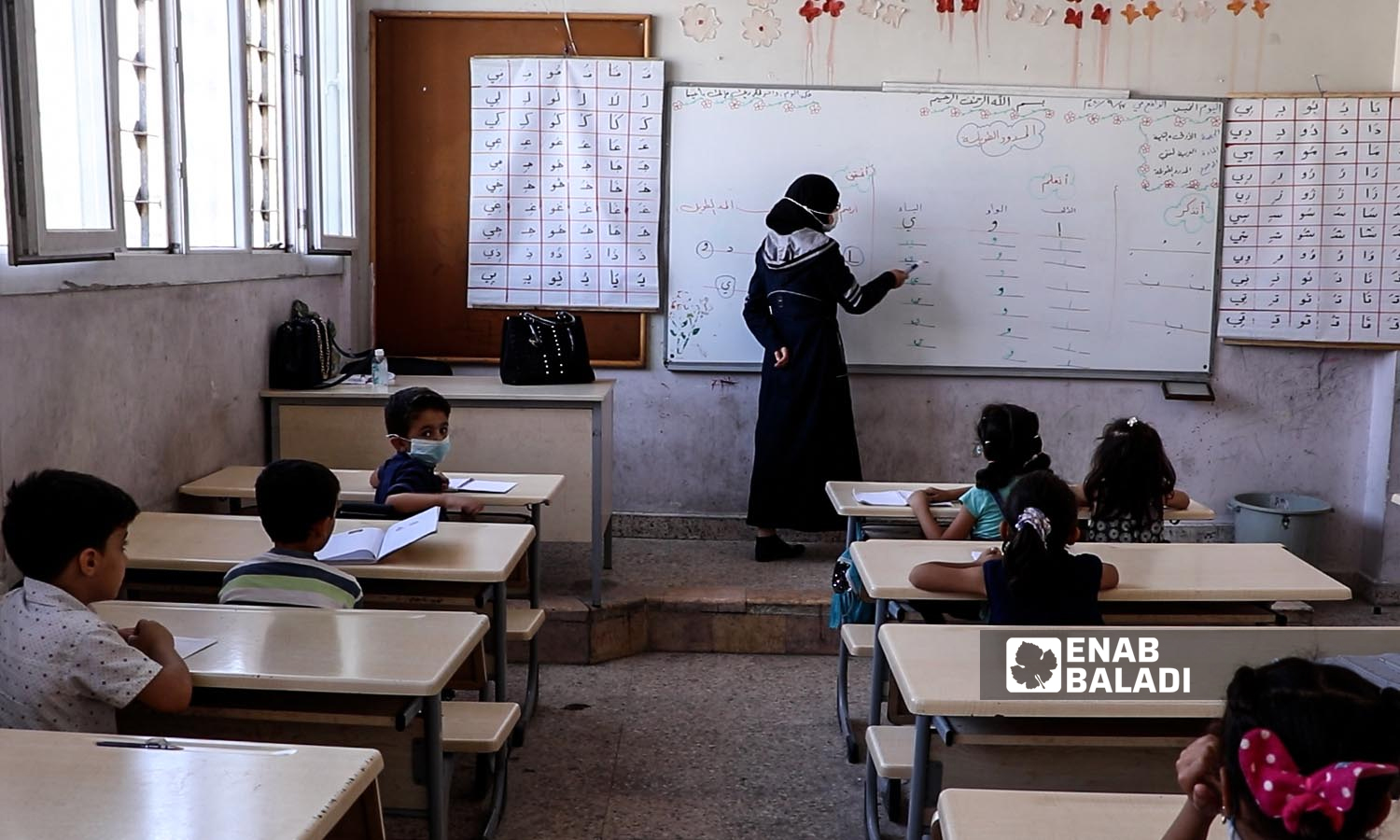
A teacher and students in a class in an elementary school in the city of Idlib – 21 April 2021 (Enab Baladi)
Hashem refuses to give up his profession in compliance with these circumstances, considering the future of children in Idlib the responsibility of everyone, and abandoning them means participating in the destruction of the educational process.
It is believed that there are plans to disrupt the educational process, considering that the pressures faced by teachers are evidence of this.
Several parties are responsible for the conduct of the educational process in the absence of an official body authorized to manage the process that determines the fate and future of thousands of students in northern Syria.
On the other hand, the tragedy of teachers is repeated annually, which has resulted in the closure of many schools and prompted dozens of teachers to abandon their profession during the past four years.
Many teachers resorted to stressful professions and trades to “secure a livelihood” and preserve their dignity.
“I get asked a lot about how I can feed my family, and I have been working as a volunteer for more than three years. In fact, I work with my family by cracking walnuts, but it is exhausting for my wife and children,” Hashem said.
The lack of funds has led to the closure of many schools and kindergartens, in addition to dozens of schools that are still under threat of closure.
Teachers have conducted several strikes during the past years, stressing that the lack of financial support is pushing the education sector into the abyss and threatening to close dozens of schools.
Also, the shortage of financial support prompted many teachers who do additional work in addition to education and parents to make donations to ensure the continuation of the educational process and to protect thousands of children from the danger of ignorance.
In 2021, teachers in various areas of Idlib and the western countryside of Aleppo organized protest stands under the slogan “A Teacher Without Rights… A Homeland Without Education” to demand that they be given their rights and to shed light on the issue of education that is still neglected.
Who runs education process in Idlib?
The Syrian Salvation Government (SSG), the political umbrella for Hayat Tahrir al-Sham (HTS), has been at the scene in Idlib governorate since its formation in early November 2017.
The local governing body has controlled all aspects of life, both in terms of service and administration, through a series of economic, agricultural, and educational offices.
Also, it has established service projects within the city and took over all departments and institutions, including education, water, supply, services, electricity, real estate, local media, antiquities, crossings, and communications.
Maher al-Hamdo, Director of the Basic Education in the SSG-run areas, denied to Enab Baladi, via WhatsApp message, the presence of any educational institution that is not affiliated with the Ministry of Education of the Salvation Government, although there are directorates, institutions, and unions that claim independence and are not affiliated with any party.
The Ministry of Education reviews its work in “propaganda” videos, showing what it has achieved during successive periods, which is met with widespread criticism from some teachers, who consider the matter to be nothing more than routine work, being portrayed as “achievements.”
Some teachers who spoke to Enab Baladi consider it shameful to mention such works under the framework of achievements and the development of education, as they are merely supervision, inspection, and honoring activities, without regard for the teachers’ reality, who are “the cornerstone of the educational process.”
The Ministry described its activities in a video released on 4 April as “distinguished to develop the educational reality at all levels.”
The video showed honoring a number of organizations operating in northern Syria and supervising the school football championship that was held by the Future Generation School in the town of Hazano, north of Idlib. It also included the completion of the registration of students applying for the secondary and preparatory exams.
The Minister of Education appeared in the video attending a final football match in the Future Spring Championship for Schools. It also included the certification of the diplomas of secondary and preparatory school students, obtained from inside or outside the SSG-controlled areas.
The video shows the start of the semester exams in the institutes of educational complexes, in addition to reviewing the progress of education in the vocational secondary school, the opening of the Robot Exhibition, and the issuance of the secondary and preparatory certificate examination program.
Promises vs. reality
At the beginning of this year, the city of Idlib and its countryside witnessed a teachers’ strike in order to convey their continuous suffering for years and to shed light on the state of education in the northern region.
Meanwhile, the active parties claiming responsibility for the teachers did not take a clear move to save education and meet teachers’ demands.
Haykal Mohammed al-Issa, a teacher and member of the strike coordination committee, told Enab Baladi that the teachers’ demands were to secure a permanent salary that preserves the teacher’s dignity and reform the educational process in the region.
Although the Ministry of Education of the Salvation Government promised emergency solutions to the educational process and started implementing a plan as of mid-February to include most of the volunteer teaching staff, the “solutions” were limited to a grant of 1,300 Turkish liras, which was given once to about 5,000 volunteer teachers.
The grant was provided by the Ummah organization, in coordination with the Ministry of Education in the Salvation Government, with promises to repeat it and to secure food baskets for teachers, according to al-Issa.
Al-Issa attributed the teachers’ retreat from their strike to the inability of the Ministry of Education of the Salvation Government to support teachers without funding from the “war merchants” who run the government, forcing the government to pressure the teachers to halt the strike.
In a poll conducted by Enab Baladi on its official website, 74 percent of the 86 voting participants considered the lack of funds to be the reason behind the confusion in supporting Idlib teachers, while 26 percent attributed the reason to the mismanagement of financial support.
Four directorates, scattered efforts
For years, the four educational directorates have proven their inability to provide financial support for teachers, in addition to their apparent weakness in providing the minimum requirements for the educational process, such as books, salaries, logistical equipment, and repairing schools.
The four directorates claim that their work is independent of the Salvation Government, while the government assured Enab Baladi that it fully supervises the directorates’ work.
The Free Idlib Education Directorate appears at the forefront of the Education Department, as it includes the largest number of teachers and is responsible for officially registering teachers and coordinating the support provided to schools and teachers.
In the past years, the Aleppo Education Directorate, the Latakia Education Directorate, and the Free Hama Education Directorate were established to cover the areas controlled by the Salvation Government, which includes Idlib governorate and its countryside, western Aleppo countryside, part of the northern Hama countryside, and part of Latakia countryside.
The four directorates operate independently of each other, and each directorate includes a number of officially registered teachers and is responsible for managing the financial support provided to them.
Haykal al-Issa, a teacher and member of the strike coordination committee, attributed the dispersal of the education sector to the multiplicity of parties in-charge and the presence of parties operating without coordination.
Mahmoud Basha, director of the Free Idlib Education Directorate, justified the poor living conditions of teachers by the lack of financial support, which forced most teachers to work for free.
Basha explained to Enab Baladi that the Chemonics organization’s funds returned about four months ago to cover the need for 4,000 teachers registered with the Education Directorate, along with about 3,000 other teachers whose salaries are covered by local organizations, while about 6,000 teachers registered with the Directorate are still working on a voluntary basis.
For his part, Marwan al-Hammadi, director of the Free Hama Education Directorate, told Enab Baladi that the directorate, which was established in 2014, aims to communicate with the authorities concerned with educational affairs from organizations and others to secure salaries or monthly dues for the 190 teachers in its affiliated schools, of which 160 work voluntarily.
According to statistics obtained by Enab Baladi from the Free Latakia Education Directorate, the total number of teachers officially registered with the Ministry of Education reached 600, including 32 volunteer teachers.
In addition to the four directorates, the Syrian Teachers Union appeared in early 2021, but it is still not operational.
Most of the teachers Enab Baladi spoke to expressed their indifference to the union’s existence, doubting its feasibility, as it is “mere formalities” that will not change their reality.
In the opinion of the teacher, Shaaban al-Ali, the only solution to change the reality of teachers is to provide them with fixed salaries by the Education Directorate.
Promises that do not meet needs
Under the slogan “Building Civilization Begins with Building People,” the Prime Minister of the Salvation Government, Ali Keda, pledged to develop human resources and subject the residents to specialized and professional courses.
However, this did not prevent Idlib’s teachers from striking and protesting. Last February, the city witnessed a sit-in by teachers entitled “The Dignity Strike,” during which they demanded rewarding and permanent salaries that would guarantee them a decent life.
The teachers called on the authorities responsible for the educational process and donors to find solutions to restore part of the teachers’ rights, improve their financial conditions, and give them salaries that meet their most basic needs.
Following these protests, the Ministry of Education issued a statement promising to find emergency solutions for the educational process and to start implementing a plan that will include most of the volunteer cadres, which will continue until the end of the current school year.
The Education Ministry vowed to rearrange the internal papers of its directorates and complexes in a way that serves students, teachers, and the educational process, at the same time calling on teachers to return to their work and follow it up with promises that the Ministry will make efforts to improve the educational process.
Maher al-Hamdo, Director of Education, explained that the efforts of the Salvation Government with the support of volunteer teachers are related to providing financial grants and relief baskets, in addition to coordinating with organizations to obtain financial support.
As al-Hamdo explained, the Education Ministry is joining hands with the rest of the ministries to secure support for teachers and coordinate with organizations, and an “organizations’ supervisor” has been appointed from the Ministry of Development to communicate with organizations for this.
The Director of Education did not provide an answer about the amount of wages that teachers receive and whether they are intermittent or permanent, but he confirmed the subordination of all educational institutions in the areas controlled by the Salvation Government to the Ministry of Education, adding that in regard to private educational institutions, they must obtain a license from the Ministry.
Ministry, Union, and Directorate
Three bodies fail to provide funds to Idlib teachers
Thousands of teachers have been working voluntarily in the areas of the Salvation Government in Idlib, northwest Syria, for more than a year, hoping for the return of funds to the education sector after its almost complete interruption since 2019.
The deteriorating economic conditions in Idlib forced a large number of academic teachers to move to work in other specialties, such as working with relief organizations that pay high salaries compared to any other work in the region.
There are several bodies in Idlib whose mission is to organize the educational sector, namely the Education Directorate, the Education Ministry, and the Syrian Teachers’ Union.
But despite the presence of these bodies, they failed to provide support for teachers, teachers say.
A principal of a school in the town of Ariha near Idlib, who asked not to reveal his name and the school’s name because he is not authorized to speak to the media, told Enab Baladi that the Education Directorate, since its establishment until now, does not provide material support to teachers, but rather supervises and directs organizations to provide funds to schools.
He added that all administrators and workers in the Directorate of Education and the Ministry of Education receive a fixed salary.
The principal mentioned that there are bodies that provide partial support to teachers, such as the Chemonics organization through its Manahel project, as teachers of the first cycle (from first grade to fourth grade) are supported for only six months in the school year.
As for the second cycle (from the fifth to the ninth grade) and in secondary schools, teachers are supported by private organizations, including Midad, which signs contracts with specific schools for one year or more.
The school principal pointed out that teachers and staff in the rest of the schools have been working voluntarily for more than three years, and some of them receive unstable symbolic salaries through support provided by merchants or parents.
He also showed that teachers who receive support receive 150 US dollars for only six months, which means 75 US dollars per month throughout the year, while the volunteer teachers received a financial grant of 1,300 Turkish liras (about 90 US dollars) for an entire semester.
The school director said that the educational process in Idlib is currently witnessing huge funds being spent by organizations on psychological support projects in schools, calling on those organizations to allocate part of these funds to support teachers financially and not only psychologically.
He also pointed out that part of the very large financial revenues can be allocated to the General Authority for Zakat to support education.
The principal indicated that the Authority collects large sums of money from a village, for example, but it provides financial support to a small number of families in that village.
He added that had the General Authority for Zakat allocated half of the zakat funds collected from each village, it would have been sufficient to support the teachers there.
Where is the Teachers’ Union’s role?
At the beginning of 2021, and after the confusion that occurred following the cessation of support for teachers in Idlib, the two teachers’ unions operating in Idlib were dissolved in order to be merged into one union to unify efforts in the interest of teachers.
After the dissolution of the Free Teachers’ Union affiliated with the Syrian Opposition’s National Coalition, which has existed since 2014, and the Teachers Syndicate affiliated with the Salvation Government, which was established in 2018, elections were held to form a new teachers’ union, on 14 February 2021, under a new name, the Syrian Teachers Syndicate.
Sobhi Haj Sadiq, a member of the founding body of the new union, told Enab Baladi, “The union will be launched next week, and it will set its sights on defending teachers and preserving their rights and aims to return teachers to their social standing, materially and morally, and support them in all respects.”
Haj Sadiq attributed the delay in activating the union for more than a year after merging the two previous unions to the change in ministries and the delay in forming the Ministry of Education.
In addition to re-discussing the statute more broadly, forming new committees (supervision, appeals) and holding elections from union units to branch elections.
The harsh conditions of life, and the inability of a number of members to move around easily, sometimes lead to the postponement of meetings for a week or 15 days, according to Haj Sadiq.
He stressed that “the announcement of the launch of the union is in its final stages, as the election of union units was held recently, and we are waiting for the names of the successful ones,” expecting that this will take place during the next week.
How was the union formed?
Elections for the formation of the new union began in February 2021. At that time, the supervisor of the Idlib Educational Complex, Abdullah al-Absi, told Enab Baladi that after the formation of the founding committee and the amendment of some articles in the statute, a preparatory committee for the elections was formed, and the Supreme Committee for it was elected.
He stated at the time that the members of the union units were elected under the supervision of the electoral committees in the schools and that a union unit was formed in each school.
Quantity and quality problem
Dr. Raymond al-Maalouli, an academic and researcher in education, told Enab Baladi that educational cadres in northwestern Syria suffer from a double problem, quantitatively and qualitatively.
The quantitative problem is represented by the lack of specialized teachers, compared to a large number of students, while the other problem is related to the quality of teachers.
“There are academic teachers, and they are few, while the number of volunteer teachers who do not have an educational qualification is much more,” according to al-Maalouli.
The academic specialist in education called for the need to conduct continuous pressure campaigns on the authorities responsible for the educational sector to adopt the project to rehabilitate teachers, whether specialists or volunteers.
These bodies can also participate and coordinate with civil society organizations to secure support for teachers, in addition to requesting assistance from international organizations and redirecting this aid in order to put it in this very necessary framework, he adds.
He also stressed that the educational process in northwestern Syria needs a central institution that supervises the rehabilitation of teachers and raises their teaching levels, as well as securing support and funding, pointing out that the authorities responsible for the educational process in the region can obtain support from donors, through setting the purpose of the required support.
Radical solutions cannot help
Dr. Zaidoun al-Zoubi, a specialist in quality management and governance, told Enab Baladi that the issue of education is a very sensitive one, as education is a place for “ideologization,” unlike the neutral health sector, for example, where there is no “pro-regime health or pro-opposition health.”
“While a book can be Islamic, Baathist, secular, or liberal, and education that builds generations is the focus of all ruling powers, because education means identity, belonging, and loyalty, so fear of education exists among all those forces,” according to al-Zoubi.
The specialist in quality management and governance assured the teaching staff in the education sector is more available than in other sectors, explaining that those with a baccalaureate degree can teach first and second grades.
For example, a person who studies without graduating from the Faculty of Engineering can teach in preparatory and secondary schools, pointing out that the education sector can be penetrated relatively easily in terms of knowledge, and therefore domination of it is easier for the armed factions than the rest of the sectors, he added.
Al-Zoubi also referred to the neglect of the education sector, which needs to allocate huge funds to cover the expenses of hundreds of schools, tens of thousands of teachers, and hundreds of thousands of students.
Al-Zoubi gave an example of the organizations’ lack of interest in supporting education in Idlib, which is controlled by the Salvation Government, as these organizations ask themselves about the benefit of supporting “radical Islam.”
The health sector in northwestern Syria was supported from the beginning by four or five organizations that ran the sector, while it was difficult to manage and control the education sector with a large number of educational institutions (about 70 institutions).
Al-Zoubi stressed the absence of radical solutions to the problem of the education sector in northwestern Syria, stressing that “unless negotiations take place between the de facto forces, the Turkish government, and donors, there is no solution to this problem, and the catastrophic situation will continue.”
if you think the article contain wrong information or you have additional details Send Correction
النسخة العربية من المقال
-
Follow us :












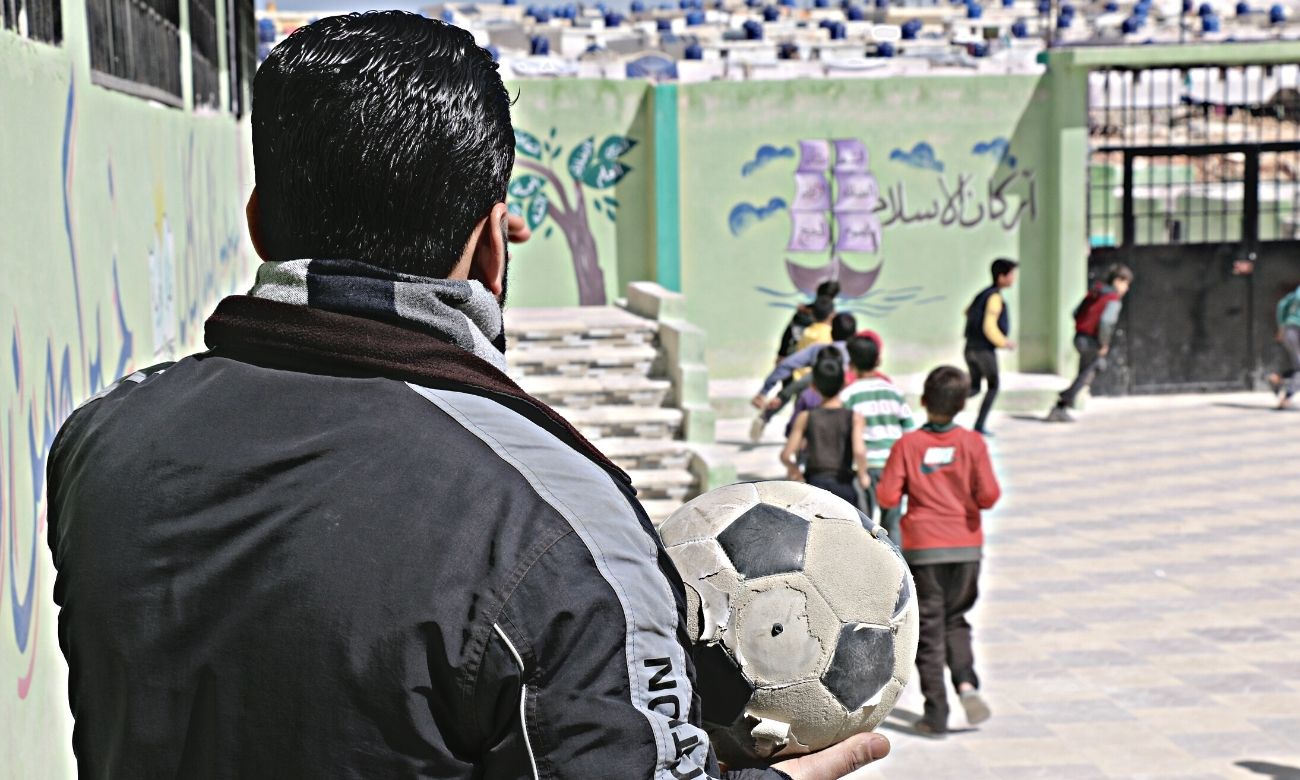
 A teacher holding a ball in a schoolyard in Idlib countryside - 9 April 2022 (Enab Baladi / Iyad Abdul Jawad)
A teacher holding a ball in a schoolyard in Idlib countryside - 9 April 2022 (Enab Baladi / Iyad Abdul Jawad)





 A
A
A
A
A
A
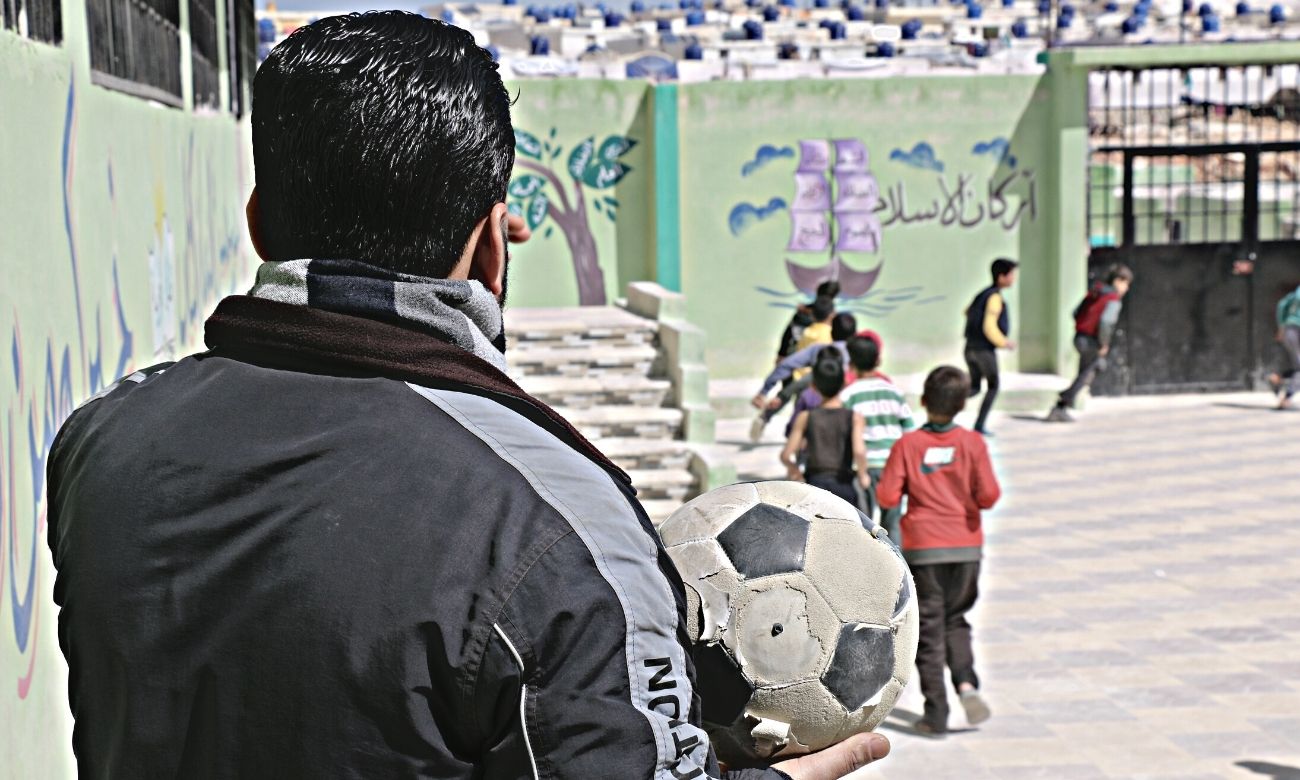
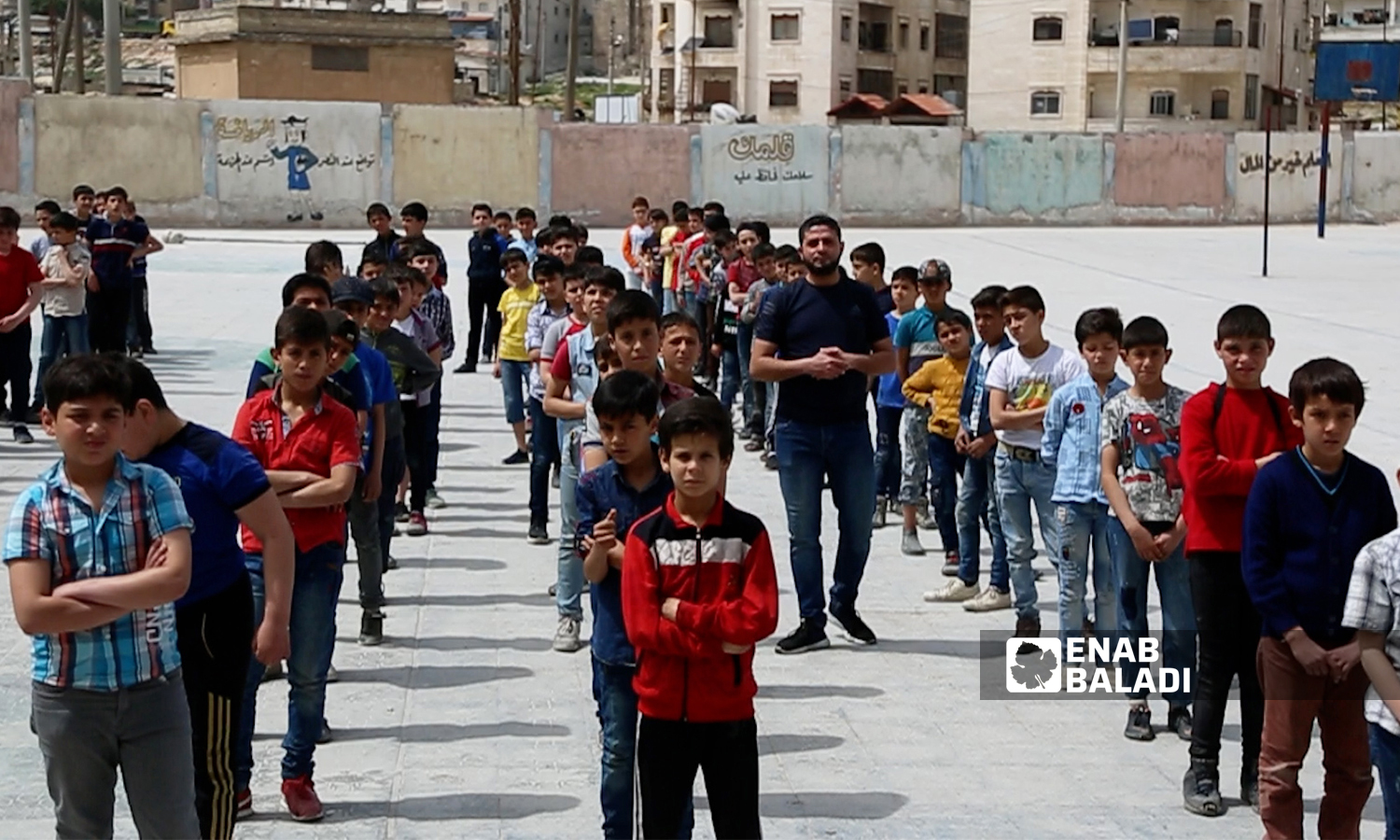
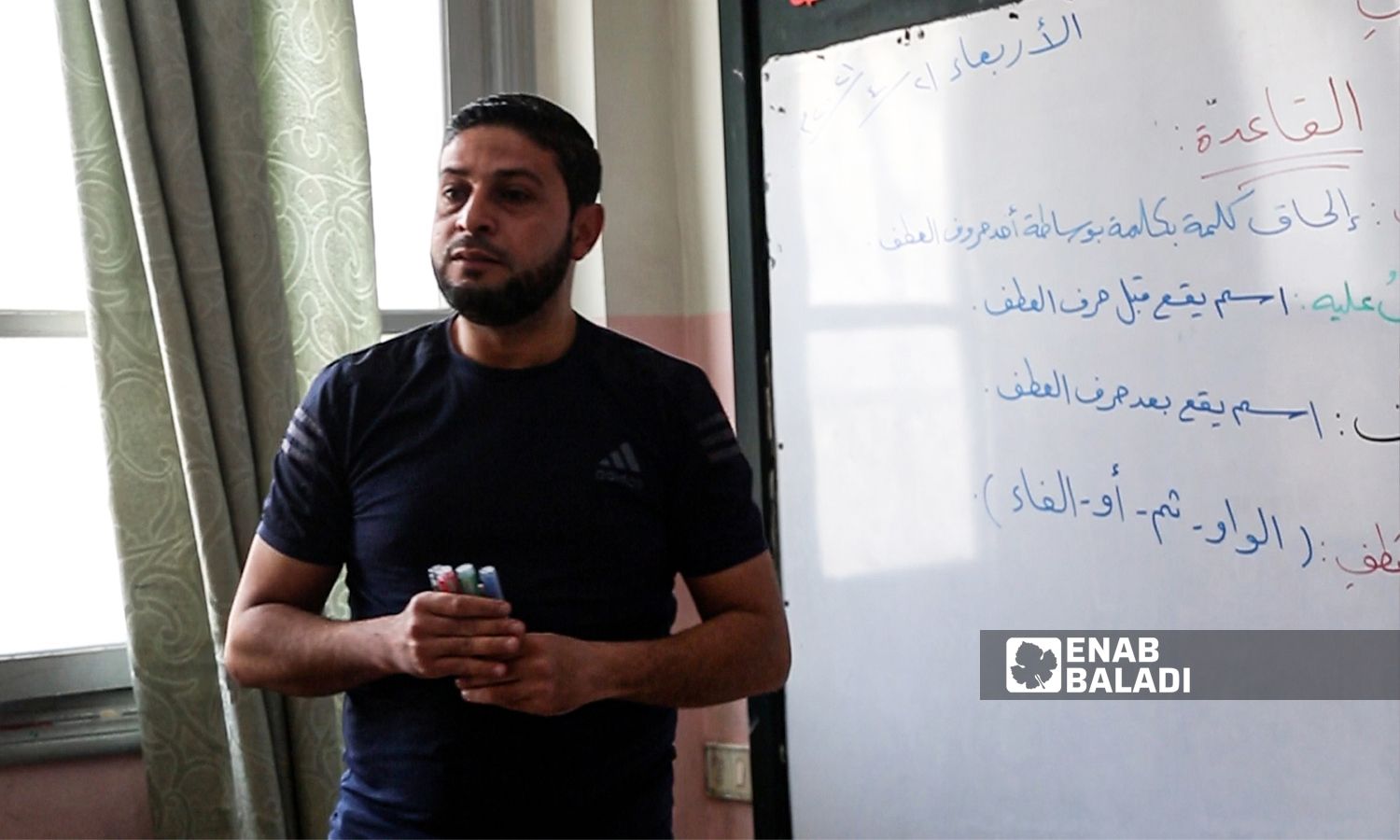







 More In-Depth
More In-Depth